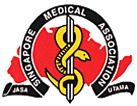
THESMANEWS
Present Issue
Past Issues
Journals
Present Issue
Past Issues
Letters to the Editor

WHO SHOULD PAY FOR CME?
When I approached a senior member of our profession regarding his response
to our invitation to him to attend the SMA Ethics Convention 1997, I was
embarrassed to learn that the convention would be held on the same day
as the annual seminar of his association. We were inadvertently ‘competing’
for the same attendees “What can we do to prevent such accidents in future?”,
he asked. The 1998 continuing medical education (CME) forecast initiative
described in the footnote below is my knee jerk response. Beyond that however,
some issues concerning CME need be urgently addressed.
The Physician’s Pledge that all doctors on being registered must take enshrines the principle that knowledge and skills should be freely imparted and shared with fellow doctors. Doctors in Singapore do generally subscribe to this. The honour of being invited to teach is reward itself.
There are many ‘free’ CME activities for doctors organised around products and procedures. It is apparently free from registration fees as those who may benefit from the greater awareness are paying for it. Many institutions also organise CME to highlight their special facilities or expertise. However, CME must also provide sound medical knowledge and teach skills that would improve care. Who should pay for these CME?
We recently learnt that the National Health Service (NHS) provides each general practitioner in U.K. with £2500 per annum to pay for his CME. The NHS can therefore plan the type of CME provided. Doctors in Singapore, unless sponsored by institutions they are working in, must pay from their own pockets. Even then, tax-deductions are only allowed on a case-by-case basis on written approval from the Inland Revenue Department. This bureaucratic ruling should be relaxed. As a first step to facilitate more funding for CME, SMA would petition the authorities to allow automatic tax deductions for the fees doctors spent on CME conducted by accredited bodies.
Though most medical bodies are providing good CME programmes at nominal cost, the temptation to charge what the market can bear for certain CME activities exists. The argument is that for those CME activities benefiting doctors attending more than the organisers themselves (through subsequent referrals) the charges should be set by the market. Therefore attempts are made to recover the full cost of their staff time, facilities plus a premium. We do not accept this argument. Young doctors starting out whose CME needs are more urgent may be unfairly penalised. Moreover organisations receiving state subsidies and with ‘monopoly’ of expertise in certain specialties has a moral if not a professional responsibility to provide CME at affordable charges.
Doctors should also invest in CME. We should budget not only money but also more importantly time from our practices for CME activities. A recurring complaint from private doctors for not participating in CME revolves around the need to spend long hours in the clinic. Paradoxically, this same complaint is heard from both doctors starting up and more successful ones.
The other grouse revolves around the intrusion into private and family
times as most CME activities are held on weekends and sometimes late at
night. In the private sector, some doctors presently do not schedule clinics
on Wednesday afternoons. If this practice is more widely adopted, then
the preferred time for CME may be on Wednesday afternoons and not weekends.
If doctors can be convinced that CME can enable them to be better doctors
with benefits to their practice, then they would make the sacrifices. The
forming of group practices would help in this aspect.
In institutions, it was traditional for many departments to reserve certain afternoons and Saturday mornings for protected CME activities. Service demands have eroded into these protected sessions. Those in charge should have broader perspective and reinstate these sessions.
Attendance of structured CME activities should also be encouraged. The first six general practitioners to pass the Master of Medicine in Family Medicine last month must have considered it worthwhile. They spent two years part-time attending weekly tutorials, lectures, several one-week hospital postings and countless hours of disciplined self-study. Similarly, many specialists attend short courses and symposiums regularly overseas to upgrade their skills at considerable expenses.
As for ad-hoc CME, the spread of CME topics presently resembles a potluck buffet. Providers are tempted to bring to the table what interest or benefit them rather than focussing on the educational needs of the attendees. Under such circumstances doctors must therefore choose carefully what they need professionally for a balanced education. They should invest their time and CME money wisely and not be distracted by the sophistication of the topics or the hospitality elements. Given their precious time, they should discriminate between those CME topics that are merely interesting and stimulating versus those that can enable and improve patient care. Over time, if many doctors were willing to support and pay only for good CME activities, then the standard of CME would improve.
The SMA submitted a paper to the Ministry last year arguing that CME activities should not be made compulsory now. If all professional bodies organising CME activities take enlightened long-term views and doctors budget for and invest their time and money wisely, then there would never be a need for CME ever to be made compulsory in Singapore.
Footnote: SMA 1998 CME Forecast
Those who would like to participate in this forecast should send the dates and details of their proposed CME activities to the Hon Gen Sec of SMA before the 1st December 1997. SMA would then compile all returns and give the forecast to those who have given input. Should proposed dates over-lap and if deemed necessary, the organisers could contact each other for discussion.